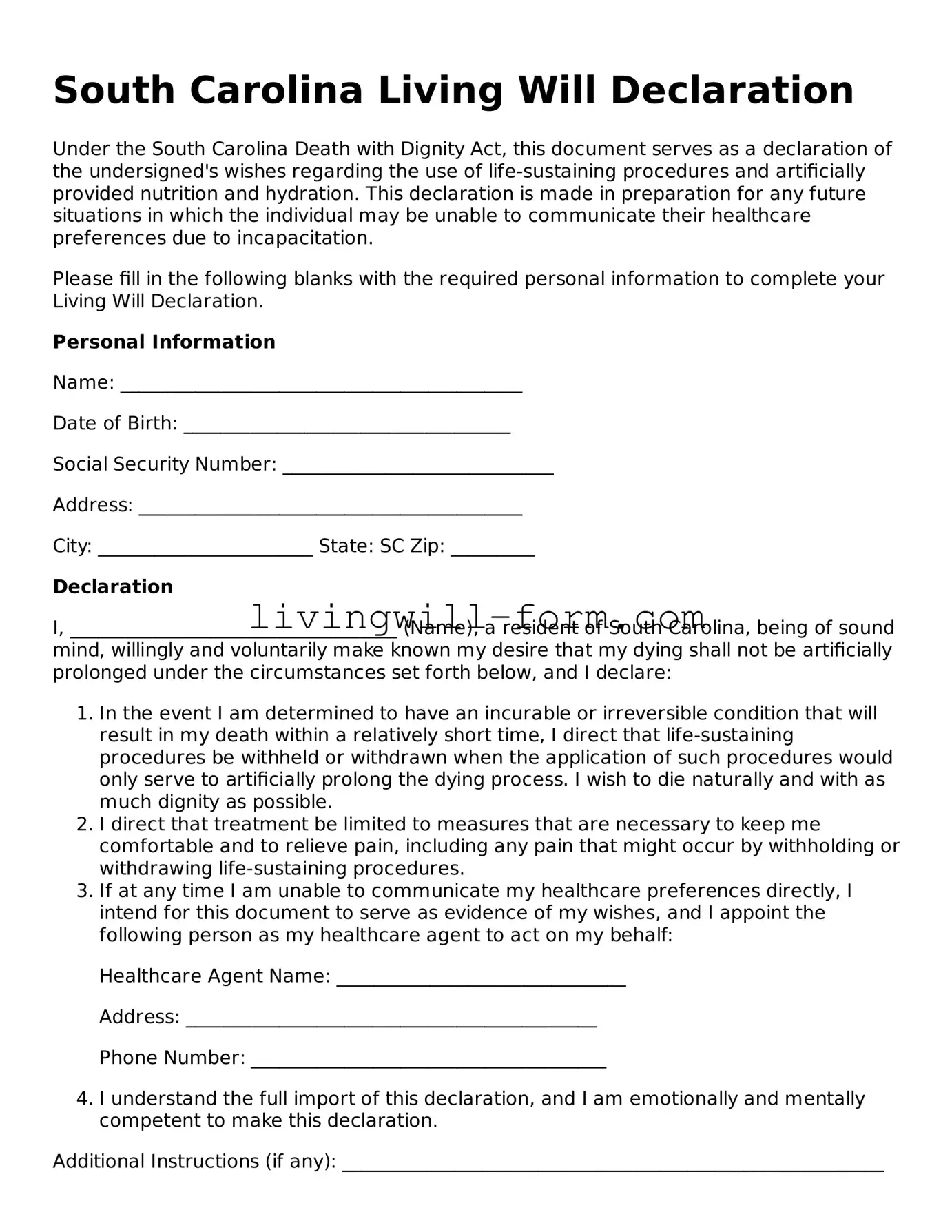What is a South Carolina Living Will?
A South Carolina Living Will, also known as a Declaration of a Desire for a Natural Death, is a legal document that allows individuals to state their wishes regarding medical treatment in the event they become terminally ill or permanently unconscious and are unable to communicate their decisions about end-of-life care. It is a way to ensure that one's healthcare preferences are known and respected by family members and healthcare providers.
Who can create a Living Will in South Carolina?
Any person who is 18 years of age or older and of sound mind can create a Living Will in South Carolina. This means the individual must be capable of making and communicating healthcare decisions at the time the Living Will is executed.
How can one create a Living Will in South Carolina?
To create a Living Will in South Carolina, the individual must complete the Living Will form, ensuring that it complies with South Carolina law. The form must be signed by the person making the will in the presence of two witnesses, and it must be notarized. The witnesses cannot be beneficiaries of the person’s estate, healthcare providers, or employees of healthcare facilities where the declarant is receiving care.
Is a lawyer required to create a Living Will?
While it is not legally required to have a lawyer to create a Living Will in South Carolina, consulting with a legal professional experienced in estate planning can provide valuable guidance. A lawyer can help ensure the document accurately reflects the individual's wishes and complies with state laws.
What can be included in a South Carolina Living Will?
In a South Carolina Living Will, an individual can include instructions about the use of life-prolonging procedures if they are in a terminal condition or a state of permanent unconsciousness. This can cover decisions about mechanical ventilation, tube feeding, resuscitation, and other medical treatments that could extend life without offering a chance for recovery.
Can a Living Will be changed or revoked?
Yes, a Living Will in South Carolina can be changed or revoked at any time by the creator as long as they are of sound mind. This can be done by creating a new living will or by a written revocation. The revocation becomes effective once it is communicated to the attending physician or healthcare provider.
What happens if you don't have a Living Will in South Carolina?
If an individual does not have a Living Will and becomes incapable of making healthcare decisions, South Carolina law allows a healthcare surrogate to make decisions on their behalf. This surrogate is usually a spouse, adult child, parent, adult sibling, or another relative. However, without a Living Will, there may be uncertainty or disputes about the person’s end-of-life wishes.
Does a Living Will affect normal medical care?
No, a Living Will does not affect the provision of normal medical care in South Carolina, including treatments for pain relief, comfort, and care necessary to provide comfort or alleviate pain. It specifically addresses procedures that prolong the dying process without a reasonable hope of recovery.
How does a Living Will differ from a Healthcare Power of Attorney?
A Living Will specifies an individual’s wishes regarding life-prolonging treatment in the event of a terminal illness or permanent unconsciousness. A Healthcare Power of Attorney, on the other hand, designates someone else to make healthcare decisions on the individual’s behalf in case they are unable to do so. It is not limited to situations of terminal illness or permanent unconsciousness and can cover a wide range of health decisions.
Where should a Living Will be kept?
After creating a Living Will, it should be kept in a safe and accessible place. Copies should be given to the individual’s healthcare providers, healthcare power of attorney agent if applicable, and close family members or friends. This helps ensure that the document can be easily found and referenced when needed.

